The Crocodile Cafe hasn’t been profitable in years. In September, the Weekly reported on statements owner Stephanie Dorgan made in court documents regarding her divorce from R.E.M. guitarist Peter Buck, saying the club hadn’t made enough money to pay her a salary since 2000. She attributed these shortcomings to long absences when she joined her now ex-husband on tour.
Problems have continued to mount: In mid-November, the Croc lost its cafe status in all but name, halting food service. And most recently, booker Pete Greenberg quit over a dispute concerning the management of a popular music-industry event.
The Portland-based retailer Music Millennium was set to hold its annual party Dec. 3 at the Croc, for which they placed a catering order just after food service was cut. At a meeting attended by Dorgan, the Croc’s staff decided to do it in-house anyway; but then, a week before the event, Dorgan changed her mind.
“It seemed like something that perhaps should have been brought up the first time it was discussed,” says Greenberg. “[Dorgan] told me if I didn’t like it, I didn’t have to work there. It was the block that toppled the Jenga.” Greenberg proceeded to turn in his keys. (Ultimately, the Croc ended up catering Music Millennium’s event, and owner Terry Currier says he plans to hold next year’s event there as well, “unless something wacky happens.”)
Former booker Joan Hiller, who left the Croc in 2004 to work at Sub Pop (she’s now a publicist for Riot Act Media), says those kinds of gaps between the needs of the venue and managerial priorities prevented more pressing matters from being dealt with. For instance, says Hiller, the roof leaks when it rains, and Greenberg adds that a window has been broken since 2001 (both Greenberg and Hiller swear that pigeons find their way into the building).
“It was always kind of, ‘We don’t need to do that and we don’t need to spend the money,'” Hiller says. (Dorgan’s cell phone voice mailbox was full, and she did not respond to a page seeking comment.)
Hiller says all but a couple of her co-workers have left the Croc, but, like Greenberg, she hopes to see the venue survive. “I feel like the main thing that’s troubling is the community issue,” Hiller says. “Seeing a place that the community loves so much losing people—it can’t remain a viable business if there aren’t people in there who can effect change in a positive way.”







